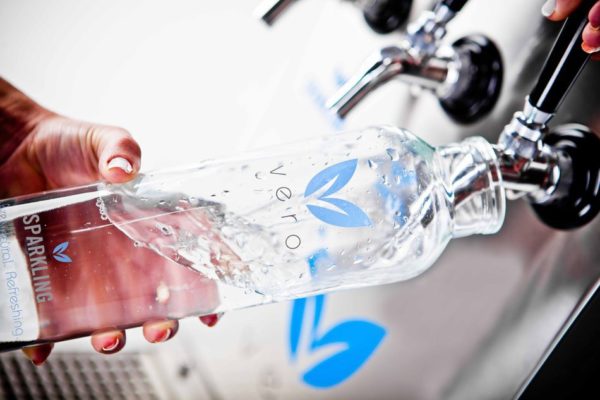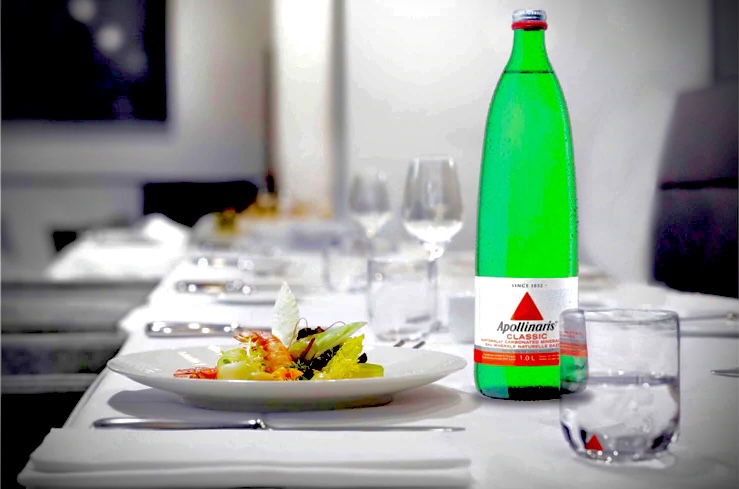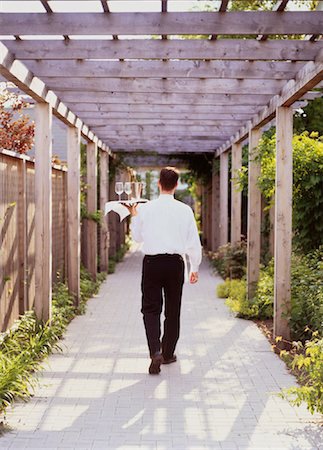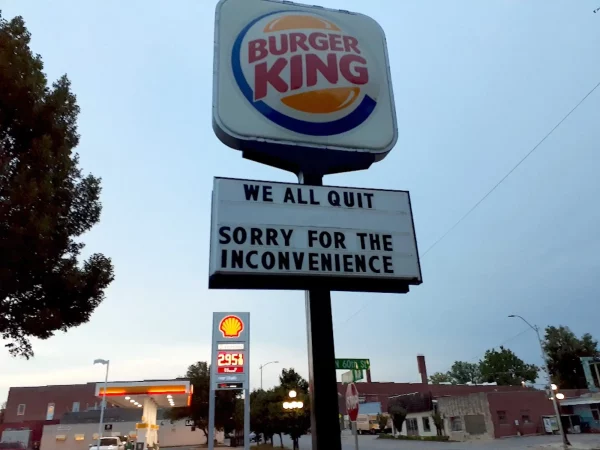In 2017, bottled water surpassed carbonated soft drinks to become the most popular beverage in the United States. While there are undeniably health benefits to more Americans choosing water over sugary sodas, the uptick in bottled water sales and marketing push toward selling pre-packaged water has also contributed to an explosion of disposable container waste. Despite having some of the cleanest municipal water systems in the world, 60% of the world’s bottled water consumption occurs in the United States, even though Americans only comprise 4.5% of the world’s total population.
Bottled water in restaurants has become somewhat of a status symbol, especially in fine dining. When I waited tables, I always dreaded asking guests for their water preference. In business settings where table-mates are unfamiliar with each other, no one feels comfortable answering for the group. Guests dining on an expense account—at least in a high-end restaurants—typically “splurge” for bottled water. You wouldn’t dare offend a client by ordering tap.
But more often than not, people are fine with regular water, and many tap drinkers are irritated by the solicitation. Nonetheless, management loves to sell the staff on the idea that establishing a guest’s water preference is an important step of service, even though most servers understand that it’s a sleazy upsell.
People justify drinking bottled water for many different reasons, as do those who prefer tap. But as global warming intensifies, the ones who choose to drink bottled are making that choice in a bubble. When that bubble finally bursts, if it hasn’t already, we all suffer for it. Charging eight dollars a bottle for San Pellegrino or Acqua Panna in a restaurant when it costs less than a dollar wholesale might be a nifty little trick, but it comes at a steep environmental cost.
Many fine dining restaurants—including several I’ve worked in—push bottled water aggressively, and they always offer imported brands. If someone is spending hundreds of dollars on a meal, it’s safe to assume they don’t need to be bothered about how many bottles of water are required to keep their glasses full, so the pour is often bottomless. Occasionally, restaurants will assign a fixed water charge per guest or even include bottled water in the price of one’s (outrageously expensive) meal. This results in trash bags filled with hundreds of empty glass bottles every night, pounds of unnecessary cardboard packaging waste, and incalculable pollution produced by transporting foreign water brands across continents. In theory, the bottles and their packaging are recyclable, but history shows that, despite our best intentions, many recyclable products end up in landfills anyway.
New water filtration technologies can purify table water using UV rays and industrial-strength charcoal filters to levels that weren’t possible decades ago. As the demand for environmentally-responsible solutions in the food and beverage industry increases, these purification systems have become more affordable, even for small restaurants. State and local governments could also easily establish subsidies or tax breaks to encourage, if not mandate, independent restaurant owners to install these systems, ideally in conjunction with tighter regulations on bottled water.

The Smith, a mini-chain of casual, neighborhood bistros in New York City, offers a clever template for water service. Their staff greets every table with a full bottle of filtered still and sparkling water—sourced from the tap and served in reusable glass bottles. Doing so simplifies the water conversation. It also removes any pretense around water service by keeping the responsibility for the restaurant’s environmental choices in the owner’s hands.
When smoking bans were instituted around the country in the early 2000s, bar and club owners insisted it would destroy their businesses. Of course, it didn’t. On the contrary, it simply forced people who were acting selfishly and endangering others to alter their behavior. Most people now appreciate being able to enjoy their dining and drinking experiences without the toxic stink of nicotine fumes.
Where plastic bags have been banned, it’s an inconvenience at first, but many people now bring reusable bags along with them on their shopping trips. As of late, many cities have outlawed plastic straws to mitigate their poisonous effect on marine life. To adjust, restaurants have either switched to compostable straws or stopped offering them altogether. All of these initiatives have proven, by and large, that drastically changing consumer habits requires drastic measures.
There will always be a contingent of people who thinks banning consumer products levies undue penalties on people who have a right to use their money to buy whatever they please. But the “capitalism defense” doesn’t hold water anymore, literally. The planet is flooding, storming, burning, and wilting—she is pulling out all stops to warn us to start treating her with more respect. Kicking back with a Topo Chico in the face of a desperate climate crisis is pure hubris.
Some may point out that restaurants also contribute pollution and waste by importing other products from distances like wine, spirits, and other specialty ingredients that are specific to certain parts of the world like caviar or truffles. While this is true, you cannot dispense wine from a faucet or grow truffles in a backyard garden. Bottled water is by far the easiest pollution-agent the industry can curtail quickly. No one needs to drink water shipped in from another country to enjoy their dinner.
Over the past ten years, there’s been a movement toward serving more local products in restaurants. One could argue that there is no better local product to showcase in a restaurant than municipal drinking water. Many studies have shown that tap water is often cleaner and safer than most bottled options. Others show that the average person can’t detect the difference, despite marketing efforts that lead consumers to believe that bottled water tastes better and is safer to drink.
We can all agree, hopefully, that whenever possible, restaurants should make more responsible choices about how their businesses impact the environment. The world is changing, and restaurants can’t always give people what they want anymore. So whether people prefer to drink bottled water or not, taking it off the menu is the right thing to do. Restaurants are about accommodating people, but there are instances when accommodating some people comes at the expense of others. Forgoing bottled water is a very small sacrifice for those who prefer it—a proverbial drop in the bucket, as they say.




